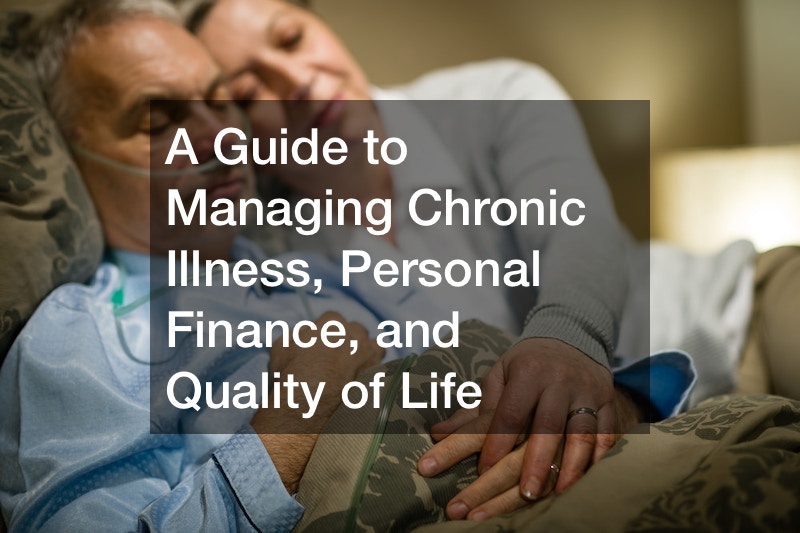
After personally experiencing a global pandemic, the health of many people was negatively impacted. The conversation surrounding chronic illness takes on new meaning when individuals who contracted COVID-19 or were impacted due to the demand for medical professionals and the strain on hospitals are invited into the dialogue. Managing one’s chronic illness tends to touch on their personal finance arrangements as the cost of healthcare can be a demanding expense. For this reason, here are some helpful considerations to make concerning the management of your chronic illness to enhance the quality of your life, and allow you to experience happiness and satisfaction in your personal finance world.
Caring For Your Mental Health
A chronic illness doesn’t only affect your body. This experience of illness can also affect your mind and unsettle your emotional well-being. It is important to seek help when the state of your mind becomes increasingly difficult to manage alone. One should not wait until you are in a dire situation to seek professional help. Psychiatry comes as a valuable tool to help you through your moments of suffering. As you manage your chronic illness, having the necessary mental health services that you need can also be instrumental in managing the impact on your psychiatric well-being.
It is entirely possible for people navigating chronic illness to experience mental health issues. Anxiety surrounding a completely unprecedented way of life could be a side effect of having to care for your body in a new way. Some people experience depression when they receive a diagnosis because of the way it could affect their chronic illness personal finance setup. For such individuals, psychiatry has tested and tried solutions to help you through your lowest moments.

Caring For The Health of Your Eyes
In some cases, poor eyesight may have been a health condition before the chronic illness came into the picture. But, for many, eye health declines as the illness settles in. This could be addressed through a variety of solutions, but not glasses or contacts. In these situations, a vision therapist can be the best expert to offer advice. By introducing people to treatment options available to them for their specific condition, these medical professionals are a great ally to the goal of managing your eyesight and health.
A vision therapist can offer treatment for many different conditions brought on by a chronic illness. And for the safety of your personal finance, they could be able to advise on ideal payment options for people looking to stabilize this aspect of their lives. Sometimes, a procedure or therapy can be replaced with another less costly option. But, patients have no idea about these alternatives because they haven’t developed a relationship with a vision therapist who would provide them with this service. Protecting your eyesight can be archived in this way.
Maintaining Your Medical Supply
One of the most costly accommodations that people navigating chronic illness must make is for the management of their medical supply. Due to the nature of the chronic illness, medication is vital in the life of someone who experiences constant pain or physical discomfort. Maintaining a good medical supply allows these individuals to have a strong say in the way they address their pain. It offers a sense of agency that may be shaken after a person receives a discouraging diagnosis. By using various mobile applications and online solutions that could help you access your medicine at lower costs, this area of chronic illness can become less of a burden.
When it comes to personal finance, purchasing medicine could be one of the greater expenses involved in your budget. By cultivating a good relationship with a pharmacy or an online store, you could have access to information when a cheaper version of a necessary drug becomes available. These relationships also give insight into payment plans that could be supportive as you navigate the changing landscape of your health.

Corresponding With Medical Professionals
By the time many people receive a chronic illness diagnosis, they might have had negative experiences with doctors who didn’t diagnose them correctly. This builds mistrust of medical professionals, due to the sense that a person’s pain has been undermined and disregarded. This mistrust becomes an obstacle to a person with chronic illness because a solid relationship with a doctor can be an access point to emerging information about specific chronic illnesses and management options that were previously unavailable in the field. If there is an obstacle preventing a person with a chronic illness from accessing new information that could enhance the quality of their life, that is an obstacle to their overall wellness.
Having a primary care doctor who understands your medical history can be a valuable support. This medical professional can even ease matters concerning personal finance with their insight into treatment programs that could alleviate your symptoms. When you can establish an authentic connection and discuss your options candidly, you end up benefiting from this arrangement. A history of negative interactions should not stand in the way of anyone receiving the support they deserve.
Caring For Your Teeth
Even for people living without chronic illness, dental care is a medical necessity. With good dental care, problems arising from tooth pain, cavities, and other dental diseases can be addressed before they snowball into conditions requiring expensive medical procedures. Beyond securing cosmetic aspects of good teeth, it can be important for people with specific medical conditions to avoid further decline in their dental health. Some medical conditions actively worsen the situation if they are allowed to go on unchecked. So, receiving care in this area has a dual effect where it alleviates the symptoms of the chronic illness, as well as prevents the chronic illness from wreaking havoc on the dental state.
Because the overall systems of the body are impacted by chronic illness, infections can be much worse in their severity. Because of this, dental infections are an experience people with chronic illness should work to avoid as they can be resilient against treatment, requiring more expensive care for treatment, when this could be avoided by further precaution in preventative measures.

Managing The Cost of Assisted Living
People navigating chronic illness might put off looking into assisted living due to the strain it could introduce to their personal finance arrangements. In the panic, they might not take into account the wear and tear caused by depending on themselves for care. The impact of this fatigue could cause medical complications. The cost of treating these medical complications could be equal to or greater than the cost of accessing assisted living services. In this way, an investment in this service is a future-focused one, allowing for there to be rest and rejuvenation that could contribute to longer periods where your health doesn’t decline.
The assisted living cost can be managed by finding flexible providers. Perhaps you do not need someone around the whole day. Maybe you only need someone to help with shopping once a week or running your errands when you feel too drained to do it yourself. When you look realistically at what you need, you may be able to craft a plan of action that serves your needs without hurting your pocket too much.
Caring For The Health of Your Skin
It can be a huge hit to one’s self-esteem when they have skin that isn’t glowing or healthy. With today’s beauty standards, anyone with less-than-perfect skin acutely feels the pressure to buy products or follow complicated regimens. It is said that the first place illness shows up is on the skin. And yet, people navigating chronic illness deserve to feel good in their skin. When these people look in the mirror, it is good for the reflection staring back at them to be one that brings them joy.
Dermatology care allows this process to happen. With a dermatologist who understands how various chronic illnesses impact skin health, you can find solutions that address your needs. The problem of shopping for solutions without this guidance is the money wasted on your personal finance setup. When you know exactly which products would be beneficial for the skin challenges you’re facing, you will save money and time in the process of getting the skin that makes you happy. Seeking out a dermatologist’s professional opinion helps you make wiser consumer choices.

Accessing In-Home Care Services
Similar to the issues with assisted living cost, people with chronic conditions shy away from seeking out in home care service. Many people would prefer to keep their homes private and not invite any strangers into this sacred space. Unfortunately, chronic illness exists within the home. And in this space, it continues to ravage the body and the mind. Ignoring this impact can only lead to needing exactly the kind of support that one could be trying to work without. Avoidance in this area isn’t an effective strategy.
Studies have shown that receiving care within one’s community has a positive effect on the management of chronic illness. As for personal finance, the impact is evident as compared to the cost of hospital-based treatment. Having in home care service allows you to relieve your family members from some of the work required to care for you at home. It also increases the number of days you feel healthy, according to statistics. Your home becomes more of a haven when you allow healthcare professionals into this space to assist in whatever way they can.
Managing Pain Relief Options
Chronic illness is painful. People experiencing it know this well. Within communities, people dealing with the same conditions help one another with suggestions surrounding medications and home remedies that deliver results. From migraine relief to back pain relief, the world of pain relief is vast and constantly tapping into the necessary solutions that people require. Because pain is one of the greatest problems people with chronic illnesses experience, a variety of solutions exist to address it in different ways. These solutions can be preventative or remedial, but they all help manage pain.
For some people, their pain is caused by stress surrounding their personal finance arrangements. For others, back pain and headaches are constant impediments. Sometimes, pain isn’t exactly pain. It could be any uncomfortable sensation ranging from numbness to prickling. All of these are legitimate experiences that require pain relief options. Developing a treatment plan requires you to sit down with a few questions and answer them honestly. This gives insight to your service provider about the kind of options that you have access to.
Managing Your Daily Living
With the myriad of healthy living tips that bombard people through social media, it might mislead others to believe that staying healthy is easy. However, the overwhelming nature of the chronic illness makes it difficult to stay on top of the daily requirements of staying healthy. By understanding what aspects of daily care are negotiable and which aspects must be done on a strictly daily basis, people navigating chronic conditions can create a menu of self-care options to choose from on days when their energy is at optimum levels. Having a good grasp of one’s energy levels from day to day also enhances their ability to care for themselves and balance their chronic illness, personal finance, and quality of life. On days when your energy is low and unavailable, forcing yourself to show up anyway might hurt more than help in the case of a chronic illness.
Takeaways
As you manage your chronic illness, allowing yourself time to adjust can help you through the newness of everything you have to consider. As you think of solutions that work for you, do not hesitate to reach out to your community and ask for help. Chronic illness is an overwhelming experience and no one should have to go through it alone. With these guidelines, you can build a network that allows you to experience the joy of living, regardless of your medical condition. By discovering new ways to meet your needs, you can thrive with chronic illness.



